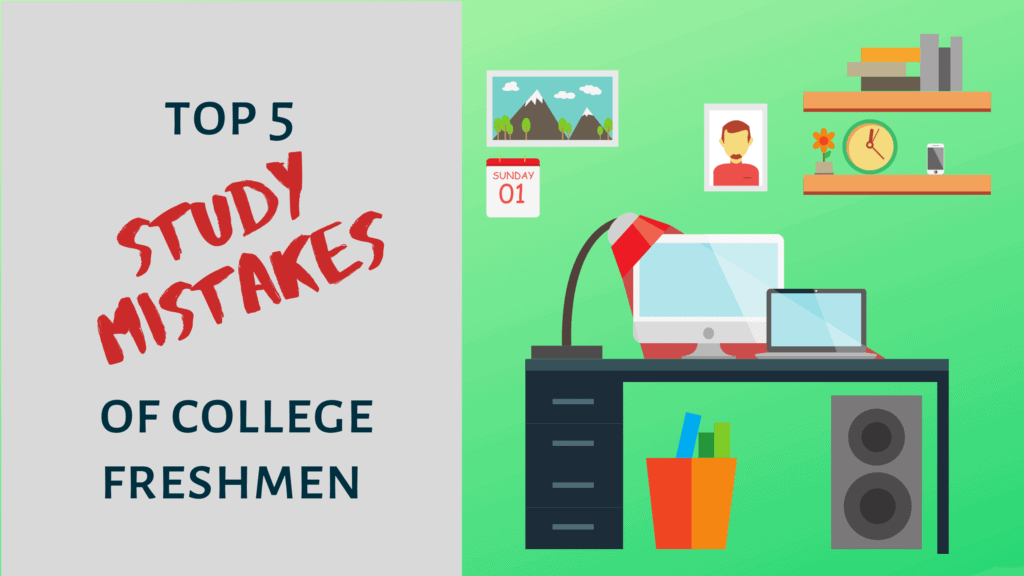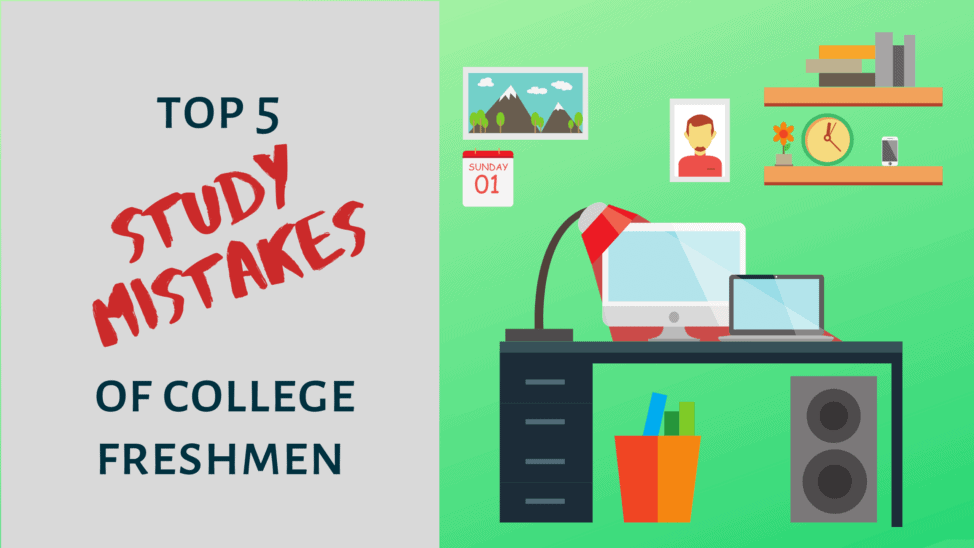
By Katie Azevedo, M.Ed.
In this post, I feature insights from Sara Pennington of SegueToCollege.com. In this Q&A, I ask Sara three key questions about misconceptions and common study mistakes that college freshmen often fall victim to during their first year out of high school.
Switching from high school classes to college classes takes time. Doing well in high school classes does not guarantee you will also do well in college classes. Solely relying on methods that worked in high school is not the best method to succeeding in college, so consider embracing a new way of thinking and new study habits.
Some students who are academically successful in high school struggle to be successful when they transition to college. What do you think are some of the reasons, unrelated to study habits, for this disparity?
1. One reason for the difficult transition is the difficulty of college assessments. High school classes tend to focus on skills like memorization or summarization. These skills require that students to think on a more linear level. While memorization and summarization are valuable skills, college classes tend to focus on skills like objective evaluation and critical thinking. These college skills require deeper-level thinking. No longer are you merely identifying key characteristics or listing terms and definitions. Now, you need to explain and defend your points following a specific set of rules.
2. A second reason is the different scope of required responsibilities. In high school, most responsibilities are tied to school and work. These two responsibilities can be demanding, but usually require less multi-tasking. If you merely try to complete what is required by a due date, you usually earn a decent grade. In college, however, more responsibilities are added to your life. On top of classes and work, you have other adult responsibilities like paying for expenses, balancing social life, and learning to live with roommates. In addition, many college majors have special requirements that add to your already busy schedule. Having to manage these responsibilities on your own, without reminders or help from a parent, is hard.
3. A third reason for the difficult transition is the lack of one-on-one attention from teachers. In high school, teachers are more likely to sit down with you and help. They approach you, reach out to you, and fight for you. In college, teachers are less likely to initiate communication. Because of their large class sizes and busy schedules, they are not likely to contact you or offer special help. They expect you to advocate for yourself, rather than having a parent intervene on your behalf.
4. A fourth reason is the difference in the grading scale. Some high schools are extremely rigorous in their academia and are more like college prep schools. These high schools, however, are the exception. Earning an A (an excellent grade) in high school usually means you fully followed instructions and met requirements. Earning a C (an average grade) at the average high school usually reflects that you turned in a mostly complete assignment.
In college, however, teachers require more of students. Most students in classes earn a C (an average grade) on assignments, because C is truly average in college. Earning an A in college requires much more than following instructions and turning in the assignment. It requires exceptional work.
What are the top 5 common study mistakes you see college freshmen make during their first year out of high school?
College freshmen have so many obstacles in their paths. They are often living away from home and making personal choices for themselves for the first time. When it comes to college academics, they often struggle with bad habits that make succeeding in college classes difficult and sometimes impossible.
1. One common study mistake I repeatedly see is the vicious cycle of catching up. What typically happens looks something like this:
A student will forget or not have time to complete an assignment. That student later works tirelessly to complete the late assignment, instead of working on the assignment for the next class period. Next class period, the student turns in the late assignment but not the assignment currently due. The cycle continues again and again, meaning the student is consistently losing points.
This well-intentioned student is causing some of his or her own problems. Instead of working on a past-due assignment over and over again, this student should first complete the currently due assignment and then on a weeknight or weekend complete the assignment that is past due. This practice keeps a student from being sucked into the quicksand of constantly being behind.
2. A second study mistake I repeatedly see is procrastination. If you don’t think you are a procrastinator, think again. Maybe you don’t like a certain class or teacher, or maybe you don’t understand the requirements or instructions. Instead of sitting down and figuring out the assignment, you might tell yourself you’ll do it later. Later soon becomes tomorrow, and tomorrow soon becomes the night before an assignment is due.
Doing the trickiest or most unenjoyable things first can energize you to get other things done. If you procrastinate, you will constantly have that one task gnawing at the back of your mind. You know that you will still have to complete it later on regardless of what other things you accomplish. Choose to get difficult assignment out of the way.
3. A third mistake I repeatedly see is a short-sighted tasklist. Rather than looking ahead to the rest of the week or weeks to come, many freshmen look merely on the next day–“what do I need to get done for tomorrow?” You do need to complete tomorrow’s assignments, but you need to think more long-term than tomorrow. Here’s an assignment notebook hack for planning ahead.
Each weekend you need to look at all of the work due next week. Some of those assignments cannot be completed quickly but require some planning and working ahead. Complete the homework for your Monday and Tuesday classes, then look at the assignments, papers, quizzes, etc. coming due. Dedicate at least 15 or 20 minutes of focused attention on these tasks. Do this repeatedly throughout the week, even though the work isn’t due tomorrow. You will be thankful you chose to work ahead on these difficult tasks in small time slots rather than cramming the night before.
4. A fourth common study mistake I repeatedly see is unfocused studying. Depending on what motivates you, studying alone in a quiet place might seem like torture. Many students regularly study in groups; while sometimes this can produce effective results, it often does not. Most of these study sessions tend to be spent talking and eating rather than truly studying. Studying alone or with a few focused peers will likely increase your focus and productivity.
Choose to complete your work at times where your mind is most focused. Let social time be social time and studying time be studying time. Truly focusing during your optimal studying hours will help you produce quality work.
Additionally, many students regularly stay up all night to finish school work. While sometimes you may need to stay up late, taking an all-nighter should be as rare as observing a solar eclipse. You would do much better if you chose to work ahead or went to bed early and woke up early to complete the task.
5. A fifth mistake I repeatedly see is asking last-minute questions. College freshmen should approach their teachers or a teacher’s assistant with questions. They should take advantage of office hours and emailing professors. However, some students make the mistake of waiting far too long to ask questions.
Showing up the day an assignment is due with questions that should’ve been asked earlier usually signals a poor grade. Questions like, “Were we supposed to turn in an electronic copy of this too?” “Did you need two copies of this outline?” or “What was the word count supposed to be again?” should be asked at least one class period before the assignment is due. The cause for these last-minute questions is usually a lack of planning ahead. Rushing to complete an assignment the night before is stressful, especially when you suddenly realize you don’t know the information you need. If you work ahead, you will be able to ask important questions and correct your mistakes.
What are some common misconceptions – either good or bad – that high school students may have about college academics?
1. One common misconception is that your GPA makes or breaks your future. Your GPA or grade point average is the average of your final college class grades. While this number is important, it does not determine your future success.
Your college GPA does matter, and you should care about it. However, limited majors should make earning a 4.0 an obsession. Unless you are in an accounting, health science, or pre-med major, your GPA does not need to be extremely high. Those majors usually require more schooling or have an extremely competitive element to landing an internship or job after graduation.
Your focus needs to be on learning and genuinely doing your best. Typically a GPA at or above 3.0 is sufficient for most jobs, but more competitive jobs set the bar at 3.5 or higher for potential hires. If you are a student who struggles (I mean really struggles), know that college can be a great time for a new start. You can get extra help from your school’s academic resource center or tutoring.
2. A second common misconception is that college classes are much harder. Freshman level classes are usually not much harder than high school classes. (The difficulty of college classes depends much on where you attend college, your academic background, and your abilities.) However, the hardest part of freshman year typically isn’t the classes themselves. Rather, the hardest part is balancing classes, work, and a social life. Additionally, college classes come with syllabi, which allows you to work ahead when needed. This allows you to have more control over your pace.
3. A third common misconception is that college teachers dislike you. Sometimes college teachers come across as aloof, cold, and callous. While some teachers may aim to be scary, most college teachers are merely more distant from students than high school teachers, but not necessarily because they dislike you.
Your professors likely have too many students and too little time to invest in student relationships. If you rarely talk to your teachers before and after class, your teachers will not likely reach out to you. They do care about students and want to see each and every one succeed, but they often look to the student to initiate how friendly the relationship will be.
Transitioning to your college academic career will take time. You will make mistakes, forget assignments, and do less than you’re capable of at times. However, you can avoid common study mistakes and misconceptions by preparing to put your best foot forward.
ABOUT SARA PENNINGTON
With experience teaching both high school upperclassmen and college freshmen, Sara helps college freshmen and their parents transition from high school to college. Her blog, Segue to College, provides tips on transitioning to college life, college academics, dorm life, and living away from home. Her book, The Complete Guide to Your Freshman Year of College, helps freshmen navigate their first year of college dorm life, social life, academic life, and family life. You can find her on Pinterest, Facebook, Instagram, or learn more about Sara on her blog.
MORE RESOURCES FOR COLLEGE STUDENTS:
- How to finish a college semester the right way: 10 tips
- Study tips for college students
- FAQ: College majors and minors
- 3 Bad Study Methods That Are a Total Waste of Time

